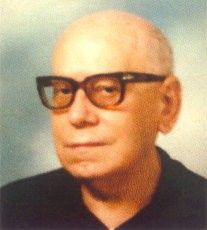Daniel Comboni
Comboni Missionaries
Institutional area
Other links
Newsletter
In Pace Christi
Zambruni Pietro
Fr. Pietro Zambruni was born on 3 July, 1925, at Casalmaggiore in the Province of Cremona. He attended secondary school at the diocesan seminary. In the summer of 1942 he joined our Institute at Florence where, on 7 October, 1944, he took his first vows. He studied theology at Verona and made his final profession at Venegono on 23 September, 1949, and was ordained priest in Milan on 3 June, 1950. He spent August to October, 1951, in France and afterwards stayed in Italy until 1953, teaching at the junior seminary in Crema. In 1953, he was appointed to Egypt.
After spending a year at Zahle, in Lebanon, studying Arabic, he went to Egypt in 1954, and remained there until 1982. His fields of apostolic work were Assouan (23 years), where he worked mainly as curate among the Coptic Catholics, and Cairo (5 years), where he was Superior and Parish Priest of Sacred Heart Church.
At Assouan, “Abuna Butros” did his best to stay close to the real situation of the people, endeavouring to overcome the concepts of “nationalism” and “foreigner”. In 1957 he went to stay with a Coptic Catholic priest at Nagada for some time to study the Coptic rite (followed by the majority of the faithful around Assouan parish). He returned from Nagada with Samuil, the new sacristan who was also a domestic worker, cantor and deacon at the Coptic Masses. This man was later to become the father of the future Comboni Sister Angele Bishai, who is now working in Sudan. Samuil was the right hand man of the Combonis for almost fifty years and “Abuna Butros” was helped by him to learn perfectly the Coptic language and rite. In 1977, he moved to Cairo and Sacred Heart Church where he remained until 1982. After his many years in the mission of Egypt, Fr. Pietro was appointed to Sudan on 1 January, 1982. Before taking up his new appointment, however, he went to Rome for the renewal Course.
Fr. Salvatore Calvia, when telling him of his appointment, encouraged him saying that he, being such an expert missionary, would make a great contribution to “that promising mission”. He should have gone to work at the catechetical centre of (Palica) Rumbek, in the formation of catechists and in some development projects but Fr. Pietro had problems with his health that delayed his departure. The treatment went on for some months and so he arrived in Khartoum in 1983 and was appointed to the Cathedral of El Obeid. Towards the end of 1985 he was appointed Superior of the community. In 1988 he was entrusted with the task of buying and adapting a new house. At the same time, the parish required a lot of work due to the great influx of refugees caused by the painful conflict with South Sudan that had become more bitter in recent years. Fr. Pietro did his best to help the people and to alleviate their sufferings. At the end of 1989 Fr. Vittorio Barin arrived and was appointed Parish Priest and Superior of the community. Fr. Pietro continued working for many years at El Obeid in ministry and in the community where he was also the bursar.
In 1999 he became seriously ill and was taken to Milan, reaching the hospital almost in a coma. He had a double blood clot on the brain. The surgery was a complete success and the following day Fr. Pietro recognised Fr Lorenzo Tomasoni who was praying at his bedside. He was discharged from St Raphael’s and, after a few months, was already up and about and ready to return to his mission. With his remarkable dedication, he was back in Sudan at the end of July. He carried on serving the community of El Obeid for some years up to 2003 when, due to worsening health, he was transferred to the Provincial House at Khartoum Bahri, where he stayed just a few months.
Once back in Italy for treatment, he wrote to his Provincial, Fr. Luigi Cignolini, asking to be assigned to the Italian Province. Fr. Cignolini replied that the Provincial Council had no objection to this but regretted his departure “after your years spent among us, your service at El Obeid both at the cathedral and in the community, with your cheerful character that eliminated tensions ... and, of course, your Arabic”. When news of Fr. Pietro’s death reached El Obeid, everyone began telling stories of this confrere, loved and esteemed by both Christians and Muslims. Many Christians remembered the white Suzuki Fr. Pietro used to drive along the rough and sandy roads of El Obeid. His presence indicated help and support for many poor people.
Da Mccj Bulletin n. 254 suppl. In Memoriam, gennaio 2013, pp. 94-99.

